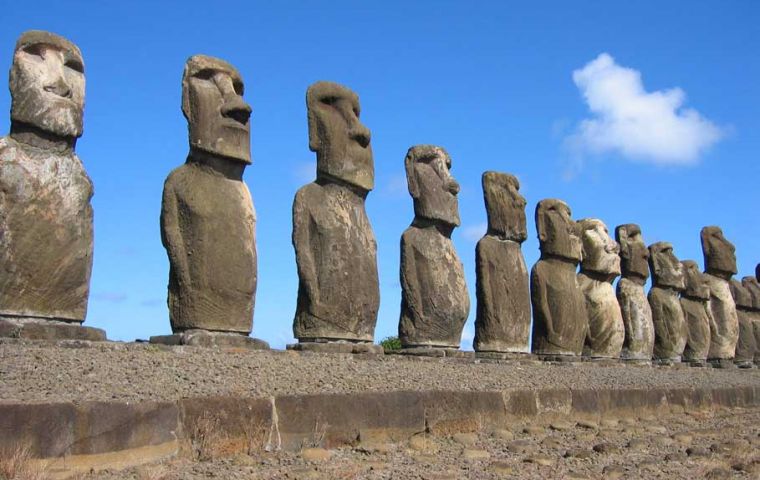MercoPress. South Atlantic News Agency
Easter Islands now a “special territory” with more autonomy
 Moai on Rapa Nui (Easter Island)
Moai on Rapa Nui (Easter Island) The Chamber of Deputies of Chile this week approved an initiative that designates both Easter Island (Rapa Nui) and the Juan Fernández archipelago as “special territories.”
The change â€" technically a constitutional reform â€" is designed to grant the territories both greater autonomy and a more direct relationship with the central government. Until now the islands have belonged, administratively speaking, to Region V. Under the new law, the Juan Fernández archipelago (also known as the Robinson Crusoe islands) will retain its administrative relationship with the Valparaíso Region but will now control more of its own funds. Easter Island, however, will now answer directly to the central government â€" specifically to the Interior Ministry. As part of the constitutional reform, originally presented in 2005, the two territories will also establish many of their own laws, as well as set up new local government positions. "There will now be a new administration for these special territories, which, under the new law, will each have a local governor, their own budgets and, in the case of Easter Island, a much more solid administration because of the fact that it will now depend on the Interior Minister and no longer on Region V," said Dep. Laura Soto of the Party for Democracy. "For me it's sad, because I represented (the islands), but I understand that this is a step toward what the country wants: sovereignty, but with special attention," she added. In related news, tourist-dependant Easter Island may soon be home to a massive, US$15 million hotel, to be located half-way between the island airport and the city of Hanga Roa. The project, being driven by the hotel development firm Protel, would occupy four hectares and boast 95 rooms, a spa and several event spaces. Old chicken bones show Polynesians came to South America Archaeologists are rewriting the history of the Pacific with new evidence that Polynesian voyagers visited South America at least once, and perhaps repeatedly, long before the first Europeans arrived on the scene. The new clue involves chickens: Evidence shows that chickens that were genetically nearly identical to those in Hawaii and other Pacific islands were on the coast of Chile at least a century before the first Spanish and Portuguese visit to the New World. Added to previous research showing that two species of plants from the Americas are widespread in Polynesia, it supports the case for Polynesia-America contact. The chicken bone was found at an archaeological site called El Arenal-1 on Chile's Arauco Peninsula, the earliest evidence yet found of chickens in the Americas. "In my view, the only plausible explanation for both of these transfers (plants and chickens) is seafaring Polynesians voyaging from eastern Polynesia to South America and returning," said University of California-Berkeley archaeologist Patrick Kirch. Radiocarbon dating puts the chickens at the site within the 1300s â€" long before Columbus' 1492 arrival in the Caribbean. And the chickens could have been there earlier, since there is no way to tell whether the Arauco site contains the continent's oldest chicken remains. The team also conducted DNA studies and found that the Arauco chicken was closely related to chicken remains from archaeological sites in much of Polynesia dated to the same period, including samples found at Kualoa on O'ahu, Anakena on Rapa Nui and in Tonga and Samoa. It is possible that there was just a single contact â€" a double-hulled voyaging canoe that landed on mainland South America, traded chickens for sweet potatoes, and departed, never to return. Because of known multiple transfers â€" chickens showing up in the south and sweet potatoes coming from the northern part of South America â€" repeated voyages seem likely. The Santiago Times




Top Comments
Disclaimer & comment rulesCommenting for this story is now closed.
If you have a Facebook account, become a fan and comment on our Facebook Page!